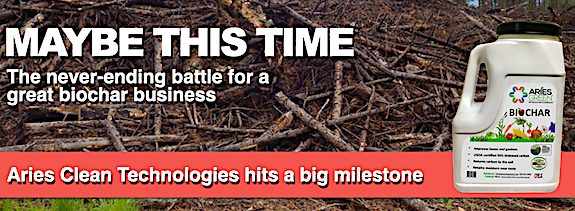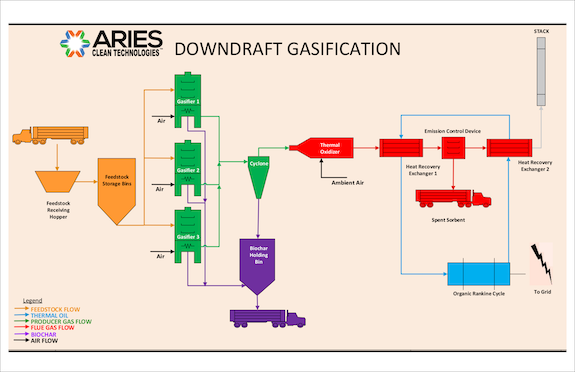Maybe This Time: Aries Clean Technologies hits a milestone in the never-ending battle for a great biochar business

OK, let’s talk openly and honestly about syngas and biochar and whole darn thing. Grab some wood waste, somethin’ to whittle with, pull up a cha’r, and let’s have some plain speaking.
Here in Digestville, we’ve had quite a few years and quite a few companies educating us on how wonderful and attractive and lucrative the syngas and biochar markets are, until the companies dry up and don’t come by any more. We’ve had a few long nights studying the projections and the technologies to understand where the disconnects are.
Here’s how we have to come to understand it. You can finance a bioenergy project making gases and solids, so long as your gas is a solid stream, and, solidly sold, and your market for solids is liquid, and your liquidity is solid. If you have lots of liquidity, you’re solid, and then building out the company is a gas.
Extractive businesses vs Storage ones
Over the years, we’ve published 400 items on syngas and 156 items on biochar, and despite the setbacks, we’ve been champions and believers. Why? We think the basic proposition is solid, even if it’s a gas (caveat: when the region is committed to biomass energy as an emissions-reducing strategy). The addition of a solid product, sold at retail for $29.95 a gallon, adds a lot of value to biomass. Why, you can get timber for $60 a ton in most places, easy. And that’s not counting the value of the syngas for electricity, steam, direct thermal energy (for kiln operations and sludge dryers, for example) or combustion. Reducing biomass by 85 percent means smaller landfills, and useful products flowing from the landfill operation — it becomes an EXTRACTIVE business instead of a STORAGE business.
That’s also the reason we like Carbon Capture & Use instead of Carbon Capture and Sequestration. It’s why shows like AMERICAN PICKERS exist — that’s also about taking stored junk and extracting value. The parts are worth more than the sum of the whole, to turn the old adage on its head.
One of these days someone is going to come up with a solution that turns landfills into a true extractive business. They are kinda sorta heading down that road, but mostly they offer storage of smelly stuff at low prices.
Maybe This Time
Maybe the company is Aries Clean Technologies. I used to follow the CEO Greg Bafalis when he helmed Aurora Algae; he was smart cookie back then, and I think a learned a thing or two from that experience. Lord knows he didn’t invent Aurora or initially fund it, and he did a lot of good work to re-purpose that technology when everyone lost faith (in the investment community) about the transformative opportunities in fuels.
Back then, quite a number of investors told me, why should we make a $3 fuel when I can make a $5 chemical? So, off they went to make chemicals, until oil prices crashed. Then they asked, Why should I make a $5 chemical when petroleum companies are making $3 chemicals? A lot of good technologies went away. Now, fuels are selling for near $8. The problems were not in a lack of faith by the operators, it was lack of faith from investors.
Investors lose faith faster than the Washington Nationals lose baseball games, it seems to be the only aspect of DNA we cannot reprogram, the buyer’s remorse and investor panic that sets in when 15-year industrial projects get expensive and commodity cycles roil the business prospects. Lord, how Greg Bafalis toiled to make Aurora work. Now, he and the team have toiled at Aries, and I must say it looks so promising that I find myself humming the old Liza Minelli show-stopper, Maybe This Time.
No company is without blemishes, but there are thing to like about Aries. First, the drift of the times toward soil health and emissions reduction. They don’t have one pony pointed in the right direction, they have two. Second, there are some claims which may well be true about the transformative abilities of their downdraft gasification technology to handle wood, and their fluidized bed technology to handle odious biosolids. Having not signed an NDA nor practicing due diligence, it’s a job for the Due Diligence Wolfpack, but I’d have to say they have a lot of operating hours, and are clearly making saleable product. Third, we like biochar as a market and a product — though we wish it was better studied. Perhaps an academic journal of biochar is needed, something for the International Biochar Initiative and NIFA to consider — no better way to get academic attention than to offer publication, and grants. They are the butter and bread of that world.
The 1 Million Pound Mark
 News arrives from company HQ that, with shipments to all 50 states and Canada, Aries GREEN bio-carbon retail and commercial sales have reached 1 million pounds and launch new renewable carbon product offerings. That’s the biochar product from woods. The biosolids gasification produces a Fly-Ash which is also sold commercially.
News arrives from company HQ that, with shipments to all 50 states and Canada, Aries GREEN bio-carbon retail and commercial sales have reached 1 million pounds and launch new renewable carbon product offerings. That’s the biochar product from woods. The biosolids gasification produces a Fly-Ash which is also sold commercially.
“Sales of 1 million pounds of Aries GREEN, an Aries bio-carbon product, is a great company milestone,” said Gregory Bafalis, CEO of Aries Clean Technologies, the parent company of Aries GREEN. “And as we expand into emerging renewable carbon markets, repeat sales reinforce the fact that consumers trust our products, its quality, and its safety. Aries GREEN bio-carbon is backed by a great production team that consistently produces it to the highest industry standards.”
OK, 1 million pounds is 50 tons, or around 7 million gallons of fuel, which is what they will make at the Rodeo renewable diesel plant in roughly 3 days. So, why a big deal?
Why a Big Deal?
Greg Bafalis puts it this way. “Aries Renewable Carbon is replacing coal and becoming a green alternative to coal-based carbon products,” Bafalis added. “When industrial products, including ferrous and non-ferrous metals, are made from sustainably sourced wood and biomass, they are carbon neutral – an ideal fit for today’s circular economy.”
OK, coal replacement, that’s a plus. It’s an argument about the philosophy of energy generation rather than the brute force economics of markets and businesses so vast that public markets and policy officials give support in hopes that, pretty please, you’ll rain riches in their pocketbooks or rain jobs for their neck of the woods. But what about the biochar. Well, it’s a soil conditioner, part of your field prep, or it’s an additive for cement or asphalt. It improves lawns and gardens, returns carbon to the soil and retains moisture near roots. I used to use it on my lawn in California, biochar that is. I can’t swear it retained moisture near the roots, you’d have to ask the roots, but I will say that we were able to reduce our water application by 75 percent and nothing died. The char helped, I believe.
And, what about activated carbon? It’s used to purify liquids and gases in a variety of applications, including municipal drinking water, food and beverage processing, odor removal, industrial pollution control. Activated carbon is produced from carbon-rich source materials, such as wood, coconuts, nutshells, coal, and peat, and this fits perfectly into gasification production. Aries uses steam to activate its bio-carbon.
The Bottom Line
I’m a believer, as the Monkees sang, for the above-mentioned benefits. But it’s been a long wait. We sure whittled a lot of wood, waiting, waiting, waiting, like the guys that never get out of Casablanca. Will Aries be the one? Is Aries already the one? I sure hope so. The progress is all the right kind. It’s slow, it’s steady, they say that’s what wins the race. Maybe This Time.
More about the technology

Aries downdraft gasification system is designed for processing wood and other dense biomass residues. At the plant in Tennessee, waste wood from local businesses is diverted from the landfills and used for feedstock. Aries produces the combustible gas and bio-carbon product. The gas is used to generate energy that supplies the operating facility with excess supplied behind the meter to the adjacent Lebanon Wastewater Treatment Plant. It reduces biomass volume by up to 85%. To date, gasification conversion of wood has kept 6.6 million pounds of waste wood out of the landfill.. This continues to give Aries GREEN an edge in the agricultural biochar marketplace. This is further validation that downdraft gasification is a green and clean solution for wood waste streams. It is also certified by the USDA.
The Aries Clean Technologies backstory
In 2014, Aries constructed, and field tested the world’s largest downdraft gasifier, giving the company’s offering economies of scale to better assure positive financial returns for customers. With five times the processing throughput and fuel output capacity of earlier equipment, the new unit was a major breakthrough for both technology and market penetration. The initial deployment of that system is now operating in the Lebanon, Tennessee, and converts a blend of commercial wood waste into electric power. Click here to view a case study and ongoing results of that project.
In 2015, the acquisition of assets and patents from MaxWest Environmental, a fluidized bed gasification company, opened new waste disposal markets, including municipal and industrial sludge disposal. Click here to view a case study of the Sanford fluidized bed plant and here to read about the new fluidized bed gasifier under construction in Linden, New Jersey. With this new technology, the company rebranded to Aries Clean Energy, a name that better embraces all the solutions available
We reported in April 2017, Aries Clean Energy had a name change to reflect a shift to waste-to-energy technologies. What was formerly PHG Energy was renamed Aries Clean Energy to reflect the evolution of the clean energy and sustainable waste disposal company. Eight patents have been granted to the company for innovations in the gasification field. Most of those already have been deployed successfully in projects for both industry and municipalities, cleanly converting a mixture of wood waste, biosolids and scrap tires to electricity.
In January 2018, we reported that Aries Clean Energy issued approximately $21.4 million of new equity led by existing investors and received additional capital commitments from Spring Lane Capital of $25 million for equity in future gasification projects. Proceeds from the offering will be used to fund project development, retire debt and other general corporate purposes. Spring Lane Capital is a private equity firm focused on project finance investments for smaller-scale solutions in the energy, water, food and waste industries. Aries said at the time it planned to use the proceeds from the investment to deploy an immediate pipeline of customer-ready projects using their proprietary waste gasification technology, as well as to accelerate business development in new markets within the U.S, increase efficiencies in current products, and advance growth outside the U.S. borders. The financing marked a significant milestone for the emerging set of municipal and industrial-scale solutions providers in the waste management industry, which has been historically challenged to access affordable financing tailored to the needs of sub-utility scale projects in the industry.
“The old name, PHG Energy, worked well for us when we basically offered industrial fuel gas conversion equipment,” said CEO Greg Bafalis. “Aries Clean Energy is a brand that much better represents what we do today as well as our product line and focus going forward.”
“Our downdraft and fluidized bed gasification projects have proven themselves viable with over 50,000 hours of commercial operation,” Bafalis added. “Putting these clean and sustainable energy innovations to work in more locations, and bringing some of our latest research and development efforts to the marketplace this year are going to be exciting steps for us and for the industry.”
Category: Top Stories















